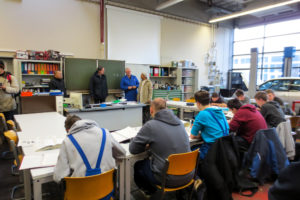
Technical Assistance for Implementation of Civil Society Dialogue and Civil Society Support Programmes (TR2015/DG/01/A5-01/001)
The overall aim of the project is to increase bilateral exchanges and cooperation between CSOs in Turkey and the EU at local, regional and national levels, to promote awareness raising initiatives on importance and benefits of membership of Turkey to the EU within Turkey and EU and on

Skills Development and Innovation Support Project
The labour market demands quick responses to changes in the market and the demographic situation. Within this scope, the assignment aimed to provide technical assistance to the Government of Macedonia and the Ministry of Education and Science (MOES) to reform the 4-year Secondary Technical and Vocational Education and

Support to the EU Integration Process of Albania
The project aims to assist the Government of Albania to strengthen the EU integration process in line with the priorities of Stabilisation and Association Agreement and accession negotiation processes by: Supporting effective alignment of national legislation with the EU acquis and its implementation. Further strengthening the capacities of

Technical Assistance for Facilitating Access of Disadvantaged Higher Education Students to the Labour Market
Research indicated that disadvantaged people, especially poor students, lack in participation in the labour market. Consequently, the purpose of the project was to increase the employability of disadvantaged people, facilitate their access to the labour market, and increase their access to public employment services. Helping disadvantaged people gain

Technical Assistance to Implementation of Civil Society Support Programme
The overall objective of the project is to support the development of civil society through more active democratic participation in policy and decision making processes and by promoting a culture of fundamental rights and dialogue.

Technical Assistance for Promoting Registered Employment
Unregistered employment remains one of the critical concerns and significant challenges of the Turkish labour market. Even though recent years have seen a downward trend in unregistered employment, a substantial portion of Turkey’s workforce is still employed without being registered with the social security system. In this regard,

